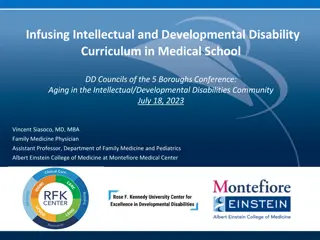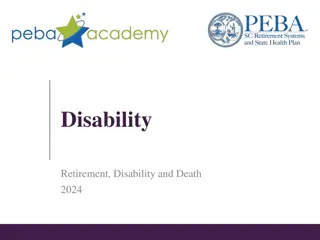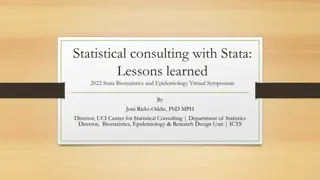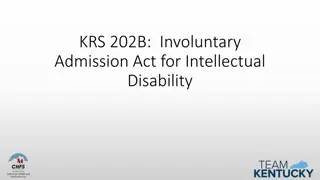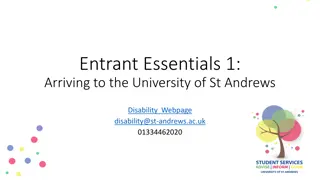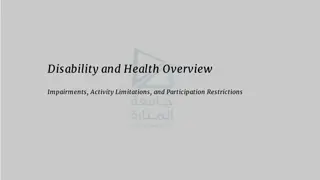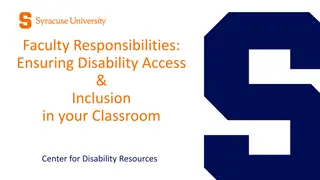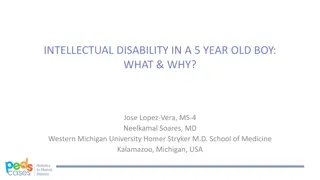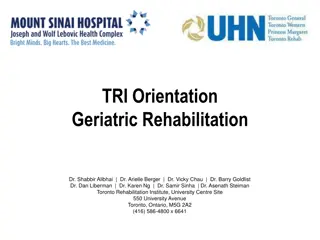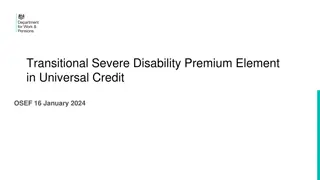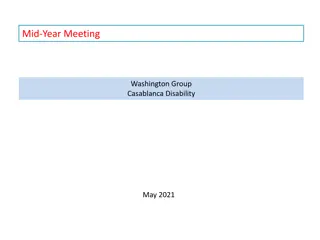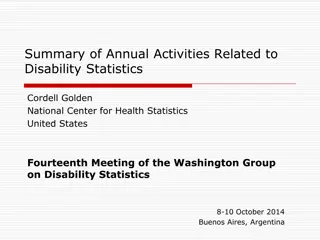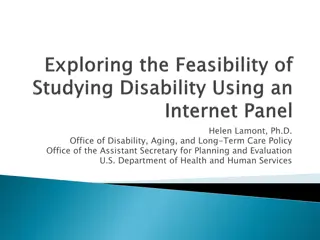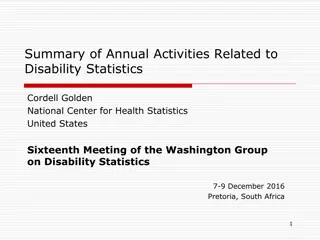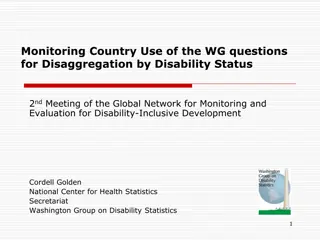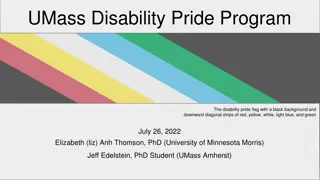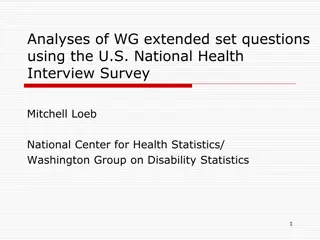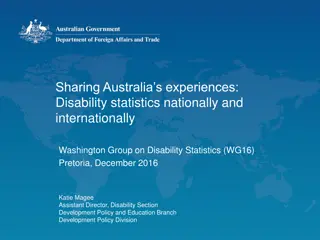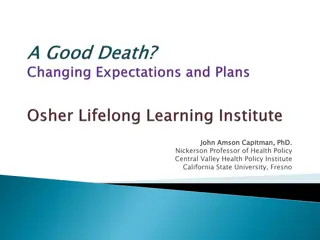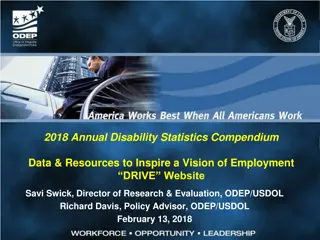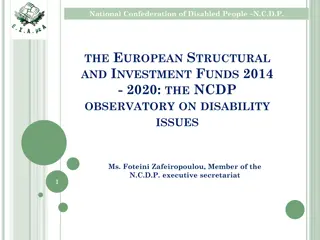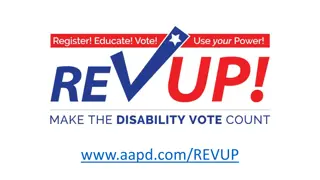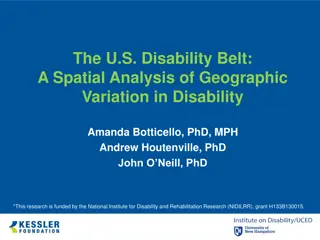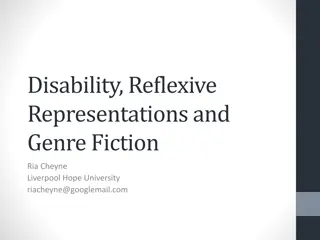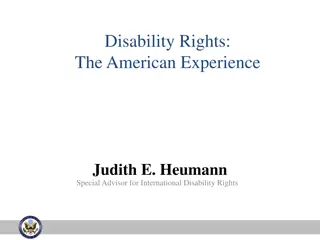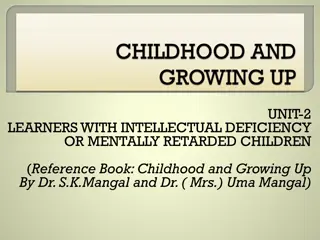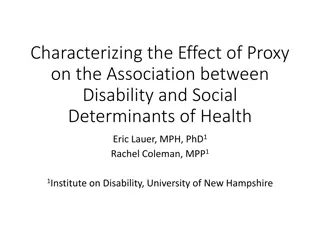Understanding Mental Deficiency: Causes and Classifications
Mental deficiency, also known as intellectual disability, is characterized by significantly below-average intellectual functioning before the age of 18, along with limitations in adaptive behaviors. It is measured using standardized IQ tests, with classifications ranging from profound to mild. Two m
3 views • 65 slides
Infusing Intellectual and Developmental Disability Curriculum in Medical School
This presentation highlights the integration of an Intellectual and Developmental Disability (IDD) curriculum in medical schools, emphasizing the importance of addressing healthcare disparities. The curriculum evolution, including grants and remote implementations due to the COVID-19 pandemic, is di
6 views • 6 slides
Models and Concepts of Disability: Understanding the Disability Process and Components
Exploring various models and concepts of disability, this content delves into the disability process, including definitions, components, and interactions outlined by Nagi, IOM, and the ICF model. It highlights the perspective that disability is not inherent to the individual and can be preventable a
0 views • 24 slides
Comprehensive Overview of Disability Benefits and Insurance Programs
This detailed overview covers disability benefits, optional life insurance, and long-term disability benefits offered by PEBA. The information includes the Standards Workplace Possibilities program, Stay-at-Work services, and important application details for disability retirement. It emphasizes the
0 views • 13 slides
Analyzing Trends in Student Placement for Autism and Intellectual Disability in California
Explore the project's goal of examining trends and factors influencing the placement of students with autism and intellectual disability in California over a 5-year period. Data obtained from the California Department of Education underwent complex data organization to build an analyzable dataset. M
1 views • 24 slides
Understanding Kentucky's KRS.202B Involuntary Admission Act for Intellectual Disability
Kentucky's KRS.202B allows for the involuntary admission of individuals with intellectual disabilities to Intermediate Care Facilities for Individuals with Intellectual Disability (ICF/IID). The process involves filing a petition in district court, evaluation by two certified evaluators, and coordin
0 views • 25 slides
Developmental Disability Eligibility Reform Amendment Act of 2022 Overview
The Developmental Disability Eligibility Reform Amendment Act of 2022 introduces new definitions, eligibility criteria, and expands services for individuals with developmental disabilities. It defines intellectual disability, developmental disability, and introduces substantial functional limitation
3 views • 13 slides
Support and Services at University of St. Andrews for Students with Disabilities
Discover the comprehensive support available at the University of St. Andrews for students with disabilities. From the Disability Webpage to the Student Services Disability Team, expect a range of services, from pre-arrival guidance to post-meeting follow-ups. Learn about what to expect when meeting
0 views • 16 slides
Understanding Disability: Impairments, Activity Limitations, and Participation Restrictions
Disability is a condition that affects the body or mind, resulting in difficulty in performing activities and interacting with the environment. There are various types of disabilities, each impacting individuals differently. The term "people with disabilities" encompasses a diverse group with varyin
0 views • 19 slides
Ensuring Disability Access and Inclusion at Syracuse University: Faculty Responsibilities
Syracuse University's Center for Disability Resources (CDR) is dedicated to empowering students, enhancing equity, and promoting innovation and inclusion by supporting faculty in creating universal design and full inclusion in the classroom. The CDR provides individual accommodations and assistive t
0 views • 25 slides
Understanding Intellectual Disability in a 5-Year-Old Boy
This case study discusses the diagnosis and severity of intellectual disability (ID) in a 5-year-old boy, distinguishing between developmental delay and ID. It covers the importance of genetic testing, particularly in cases like Fragile X syndrome, as well as the evolution of assessing ID severity b
0 views • 21 slides
Models and Concepts of Disability: Understanding Nagi's Disablement Model
Explore the various models and concepts of disability, including Nagi's Disablement Model, which delineates the pathway from pathology to disability. Learn about Nagi's definition of disability, work disability, and factors influencing the disablement process. Gain insights into impairments, functio
1 views • 18 slides
Enhance the UK - Undressing Disability Campaign
Enhance the UK is a user-led charity focusing on disability awareness and communication. They offer training, workshops, and resources to promote inclusivity. The Undressing Disability Campaign addresses reclaiming sexuality, inclusive relationships and sex education, disclosure of disability in onl
3 views • 11 slides
Understanding Geriatric Rehabilitation and Disability Models
Acute medical illnesses can lead to functional decline in elderly individuals, requiring comprehensive geriatric assessments and rehabilitation. This involves addressing factors like frailty, comorbidities, and social/environmental barriers. Disability is viewed through both medical and social model
0 views • 34 slides
Changes to Transitional Severe Disability Premium Element in Universal Credit
Responding to a High Court judgment, changes are being made to the Transitional Severe Disability Premium Element in Universal Credit. Claimants qualifying for the Severe Disability Premium will receive additional amounts reflecting other disability premiums from legacy benefits. This adjustment aim
1 views • 7 slides
Understanding the Epidemiology of Disability and Its Impact on Health
Epidemiology focuses on studying disease causes, prevention, and control. Impairment, disability, and handicap are defined by the WHO. Impairment refers to loss or abnormality of function, disability refers to limitations in normal activities due to impairment, and handicap indicates social disadvan
0 views • 31 slides
Understanding Disability Disclosure in Employment: Practical and Ethical Considerations
This presentation touches on the practical and ethical issues supported employment professionals face when dealing with disability disclosure. The agenda includes ADA provisions, successful disclosure strategies, the professional's role in the process, and available resources. The session covers dis
0 views • 33 slides
Establishing the Buenos Aires Group for Disability Statistics in Latin America
The Washington Group on Disability Statistics has been spearheading efforts to establish the Buenos Aires Group for Latin-American countries, focusing on improving disability measurement and data processing in the region. Through videoconferences and collaboration with various entities, the group ai
1 views • 9 slides
Enhancing Disability Statistics in the Arab Region: The Casa Group Initiative
The Casa Group for Disability Statistics in the Arab Countries was established to improve data collection on disability by encouraging the use of standardized tools and developing comparable indicators. Through various meetings and publications, the group aims to build capacity among statisticians,
0 views • 5 slides
Data Collection on COVID and Disability by Washington Group
The Washington Group on Disability Statistics conducts data collection activities related to COVID and disability through annual country reports. These reports include information on recent and planned data collection efforts, surveys and censuses on disability, administrative records, and specific
0 views • 13 slides
Global Overview of Disability Statistics Activities
The annual activities related to disability statistics at the Fourteenth Meeting of the Washington Group on Disability Statistics in 2014 included participation from 44 countries across different regions. The meeting discussed new and updated information from various countries, monitoring the use of
0 views • 18 slides
Internet Panel Surveys for Disability Data Collection
Researchers and policymakers are turning to internet panel surveys as a cost-effective and efficient method to collect data on disability and informal care prevalence. This modern approach offers advantages such as high response rates, speedy data collection, and lower costs compared to traditional
0 views • 14 slides
Annual Activities in Disability Statistics- Summary and Reports
Activities related to disability statistics discussed at the Sixteenth Meeting of the Washington Group on Disability Statistics included annual reports on national activities, country reports on data collection efforts, questions on the use of WG questions in surveys, and updates on questionnaire fo
0 views • 24 slides
Spotting Winning Disability Cases: A Guide from Asha Sharma and Paul McGrath
Spotting Winning Disability Cases guide provided by Asha Sharma and Paul McGrath from Disability Partners, PLLC in St. Paul, Minnesota. The guide covers case selection criteria, training staff to spot winning cases, and useful tips for representing clients in disability cases. The firm assists clien
0 views • 24 slides
Monitoring Use of WG Questions for Disability Disaggregation
The Washington Group (WG) was established to address the need for population-based measures of disability and to incorporate disability into national statistical systems. Representatives from National Statistical Offices (NSOs) form the main constituency of the WG, with approximately 135 countries a
0 views • 24 slides
UMass Disability Pride Program Session Overview
UMass Disability Pride Program session covers grounding assumptions, central terms, and concepts related to disability pride, ableism, and models of disability. The session includes introductions, explores person-first and identity-first language, and provides recommended resources for further under
0 views • 15 slides
Analysis of Disability Data Using U.S. National Health Interview Survey
The U.S. National Health Interview Survey (NHIS) conducts an annual cross-sectional household survey to collect data on various health aspects, including disability. The Functioning and Disability module within NHIS includes a set of questions to assess difficulties in areas such as vision, hearing,
0 views • 49 slides
International Efforts for Disability-Inclusive Development
Explore Australia's initiatives in enhancing disability statistics, strengthening data collection globally, and promoting disability-inclusive development internationally through partnerships and networks such as GLAD. Learn about surveys on disability prevalence and support for those in need, refle
1 views • 31 slides
Disability Employment Reform: DEA Conference 2024 'Ready for Reform'
The Disability Employment Reform conference aims to introduce a new specialist disability employment program starting in July 2025. The program will streamline services, including the Disability Management Service and Employment Support Service. Programme design, eligibility criteria, and key topics
0 views • 18 slides
Long-Term Care Needs and Disability Risk Analysis
Review the challenges and risks associated with long-term care needs, disability, and mortality compression as aging populations increase. Understand the differences between disability insurance and long-term care insurance, Medicaid benefits, and Medicare coverage for seniors. Explore the lifetime
0 views • 12 slides
Annual Disability Statistics Compendium & DRIVE Platform Overview
The content provides insights into the 2018 Annual Disability Statistics Compendium and the initiatives by the Office of Disability Employment Policy (ODEP/USDOL), including Stay-At-Work/Return-To-Work research, employer surveys, and collaboration with DOL. It highlights the DRIVE online platform ai
0 views • 7 slides
National Disability Rights Network (NDRN) Conference on Ending Homelessness
The National Disability Rights Network (NDRN) held a conference in Washington in 2017 on ending homelessness for individuals with disabilities. The event included discussions on disability rights history, advocacy avenues, working with the administration and Congress, federally funded programs, and
0 views • 19 slides
National Confederation of Disabled People (NCDP) Initiatives for Disability Inclusion and Accessibility
The National Confederation of Disabled People (NCDP) plays a crucial role in promoting disability rights and accessibility in Greece by actively engaging in the implementation of European Structural and Investment Funds. Through their involvement in policy development, training initiatives, and advo
0 views • 9 slides
Empowering the Disability Community through the REV UP Campaign
The REV UP Campaign by www.aapd.com aims to increase the political power of the disability community by engaging candidates and the media on disability issues. With statistics showing the significance of voters with disabilities, REV UP works towards voter registration, education, and empowerment th
0 views • 18 slides
Geographic Analysis of the U.S. Disability Belt
A spatial analysis of the U.S. Disability Belt, funded by NIDILRR, explores the clustering of disability prevalence in specific regions like Appalachia and the Southeast Coastal Plains. The research aims to understand contextual factors influencing disability distribution and identify high-risk clus
0 views • 20 slides
Disability, Reflexive Representations in Genre Fiction: Exploring Cultural Perspectives
Disability studies, a vital academic discipline, delves into societal perceptions and policies around disability, challenging norms through evaluative and positive-image approaches. This exploration includes cultural analysis, critical assessments, and nuanced representations in genre fiction, offer
0 views • 18 slides
The American Experience of Disability Rights by Judith E. Heumann
Explore the journey of disability rights in America, from segregation and exclusion to a transformed nation post the ADA. Learn about the U.S. disability rights movement, legislation like the ADA, and the crucial role of government in implementation. Judith E. Heumann, Special Advisor for Internatio
0 views • 12 slides
Understanding Learners with Intellectual Deficiency
Individuals with intellectual deficiency or mental retardation may exhibit immature behaviors, lack judgment, and show signs of delayed development. They require special care, early diagnosis, parental assistance, and educational support to reach a reasonable degree of educational achievement and so
0 views • 7 slides
Understanding the Impact of Proxy on Disability and Health Determinants Association
National surveys are evaluating standardized disability identifiers. The Washington Group Short Set and American Community Survey are being compared in the National Health Interview Survey. Limited research exists on these questions in disability research, providing an opportunity for analysis. The
0 views • 15 slides
Understanding Mental Disorders in Intellectual Disability: Insights and Challenges
Explore the complexities of mental disorders in individuals with intellectual disability, focusing on diagnostic difficulties, prevalence rates, and differences in clinical presentation. Delve into the interaction between intellectual disability, physical health, and mental illness, shedding light o
0 views • 46 slides

